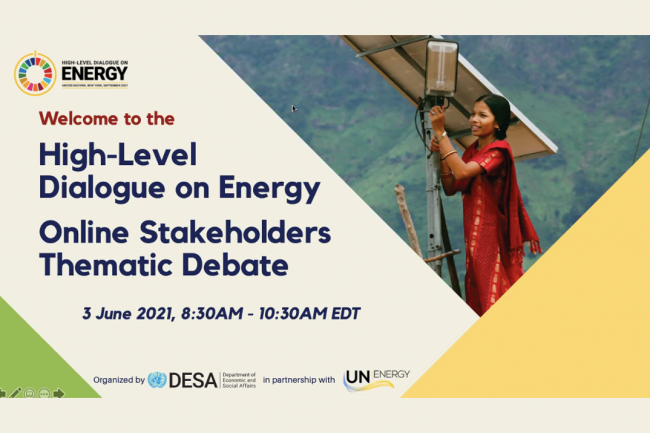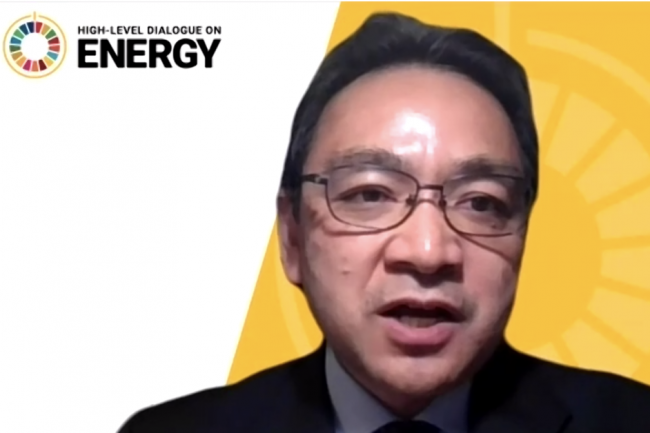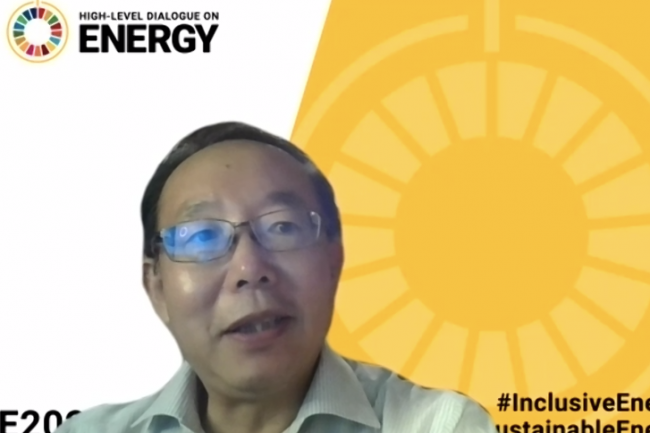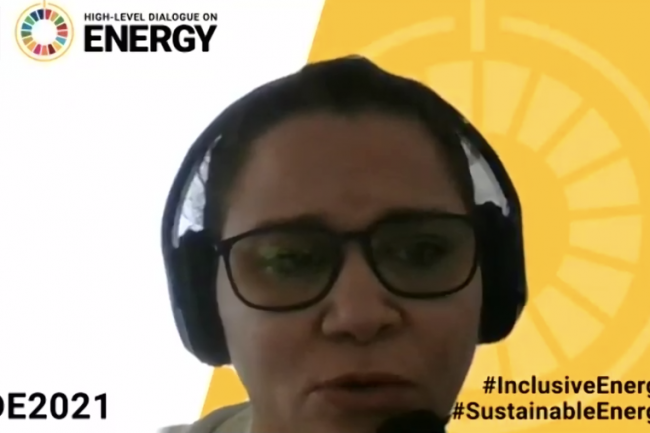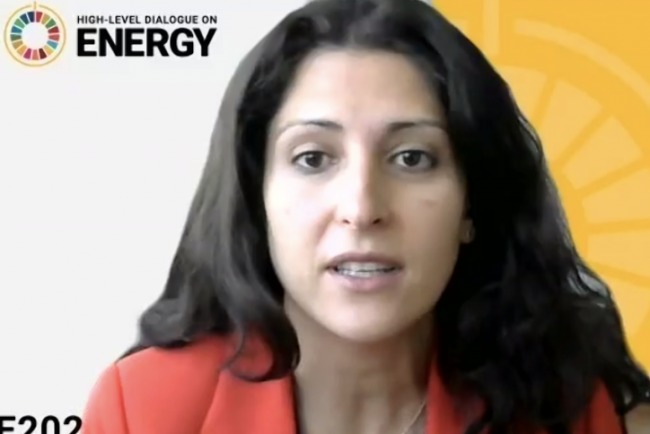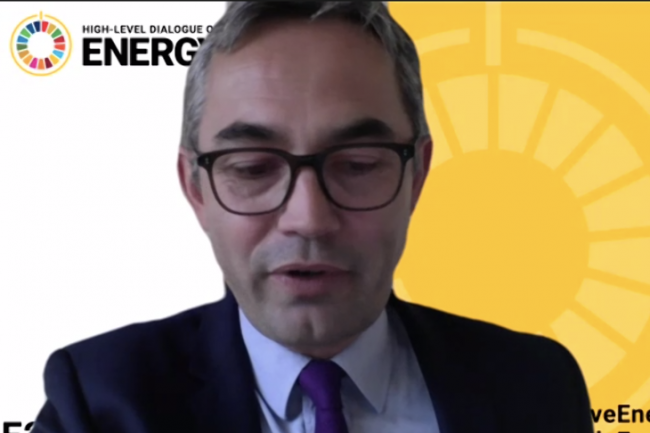The UN Department of Economic and Social Affairs (UNDESA) in partnership with UN-Energy organized an online stakeholders thematic debate in preparation for the High-level Dialogue on Energy, which will take place at the summit level in September 2021. Minoru Takada, Energy Team leader, Division of Sustainable Development Goals (DSDG), UNDESA, opened the debate highlighting that the energy agenda “sits at the middle of our challenges.” He recalled that the last global gathering in the UN General Assembly to address energy took place in 1981, when the world was in the middle of an energy crisis. He noted that we are again in a crisis, and said we need to change the way we approach the energy agenda. He called on participants to engage in the High-level Dialogue on Energy in September and to submit energy compacts.
Naiara Costa, Senior Sustainable Development Officer, DSDG, UNDESA, moderated the discussion and encouraged participants to read a newly launched report titled, “Stakeholders Thematic E-Consultation Summary Report.”
During the stakeholders thematic debate, which took place online on 3 June 2021, co-leaders of the five Technical Working Groups presented recommendations from each of the five reports that will be launched during the Ministerial Thematic Forums from 21-25 June 2021. Representatives of stakeholder groups provided comments on the themes addressed in each report, following which each speaker was asked to state one key takeaway.
Energy Access
On energy access, speakers emphasized: access to electricity and clean cooking are equally important; long-term electrification of cooking energy should be on the agenda; the challenges for remote and rural energy access including clean cooking; and we need to invest in young people and clean energy start-ups.
Stephen Halloway, Senior Advisor, World Bank, said over 400 stakeholders had engaged with the Thematic Working Group on the energy access report. He said the report highlights the need to: address socioeconomic inclusiveness; align costs, reliability, and affordability of energy services; put people at the center of efforts to deliver energy; and promote local entrepreneurship and target the engagement of women and youth.
Sunil Dhingra, Senior Fellow and Associate Director, The Energy and Resources Institute, suggested ensuring reliable energy, examining options for flexibility in payments and e-metering, and electrifying cooking energy.
Catherine Joyce, PhD Candidate at RIEL, Charles Darwin University, stressed the need for energy governance that adjusts to current and future needs for the energy objectives of communities.
Adekoyejo Kuye, Project Lead, Manamuz Electric LTD, called for stronger investment in rural communities and investing in young people’s ideas and innovations.
Energy Transition
On energy transition, speakers emphasized that the transition needs to: be a participatory process; create climate friendly jobs; put communities in the lead and pay attention to human and Indigenous Peoples’ rights; and begin now.
Hongpeng Liu, Director, Energy Division, UN ESCAP, noted that the energy transition is happening but needs to be scaled up. He said the report on this theme notes that enhanced international and regional cooperation are needed to share technology and integrate power markets, among other actions. Among the report’s eleven recommendations are calls to rapidly scale up the deployment of renewable energy, improve the average rate of energy efficiency, and phase out coal.
Paola Simonetti, Deputy Director of the Economic and Social Policy Department, International Trade Union Confederation, emphasized that climate friendly jobs are the way forward. She said national just transition plans need to involve stakeholders, and energy policies need to be linked with employment and decent work and to leverage local capabilities.
Eileen Mairena Cunningham, Advocacy Officer, Centro para la Autonomía y Desarrollo de los Pueblos Indígenas, stressed the need to ensure those affected by the energy transition are empowered and able to achieve a transition that is just.
Vince Davidson J. Pacañot, Member-Advocate, 2030 Youth Force for the SDG in the Philippines, called attention to challenges including subsidies and other incentives that support the development of traditional energy sources. He called for phasing out fossil fuels and replacing them with clean energy sources with youth on the frontline of action.
Enabling SDGs through Inclusive, Just Energy Transitions
On enabling SDGs through inclusive, just energy transitions, speakers called for taking the call for creating energy compacts seriously. They stressed the need for: an accountability framework for the energy sector that is linked to human well being; making more data available to communities so they can play an informed role in decisions about energy; collaboration; and enhancing energy conservation through building design.
Radia Sedaoui, Chief of Energy Section, Climate Change and Natural Resource Sustainability Cluster, UN ESCWA, said the report on this theme addresses the multidimensions of the SDGs. She stressed the need for financial and regulatory policies that take into account synergies and trade offs, and for implementing policies with attention to social equity and inclusiveness. She said the report calls for education, reskilling, training, capacity building, promotion of informed consumer behavior, and accelerating actions to ensure gender equity.
Soma Dutta, Senior Technical Advisor, ENERGIA, emphasized the importance of data disaggregation, promoting women’s entrepreneurship, and using gender criteria in funding decisions.
Alison Halford, Research Fellow at the Centre of Data Science, Coventry University, discussed the needs of refugees for training to support their own energy systems. She also said the perspective of women and girls as passive users of energy rather than agents of change contributes to the challenges that need to be addressed, and called for putting women at the center of designing new systems.
Charlotte Hugman, Research Lead for Climate and Energy Benchmark, World Benchmarking Alliance, called for more corporate accountability and more collaboration, including through dialogues between companies, labor and government.
Muhammad Tariq Malik, Architect & Lecturer, Cecos University Peshawar, stressed the need to pay attention to the design of commercial buildings to enhance energy efficiency.
Innovation, Technology and Data
On innovation, technology and data, speakers stressed the need to: set an ambitious and aligned vision, act locally, and leave no one behind; think of energy efficiency as a first option; make technology transfer a participatory activity; and identify local solutions.
Rana Ghoneim, Chief, Energy Systems and Infrastructure Division, UNIDO, recalled that innovation is a dynamic process and said we need more homegrown innovations that take into account the context of various regions. She noted that the report on this topic recognizes the need for innovations in policies and finance, and not just in technologies. She reviewed the report’s recommendations, which include the need to: commercialize new technologies at scale; create markets that favor energy technologies and help with the energy transition; leverage digitalization; and improve the collection, management and application of data systems.
José Ramón López, International Project Manager, Ente Vasco de la Energía, stressed the need to pay attention to demand side management, noting that the “cleanest source of energy is the energy that is not used.”
Nanda Kumar Janardhanan, Senior Policy Specialist, Institute for Global Environmental Strategies, emphasized the importance of co-innovation to overcome our challenges and adapt technologies to local needs.
Faisal Alfadl, Secretary General, Saudi Green Building Forum, said we need to have data “for the community, by the community.”
Finance and Investment
On finance and investment, speakers said we need to: turn billions of public money into trillions of private capital by making more use of blended finance; adopt robust policy frameworks; formalize the role that the local level and local governments play in achieving SDG 7; train everyone who takes office on the importance of their decisions for the energy agenda; and raise awareness and build capacity.
Manuel Baritaud, Senior Economist, European Investment Bank, said key recommendations in the report on this topic include: to achieve an inclusive recovery, countries should boost investment in sustainable energy; finance flows should be congruent with increasingly ambitious climate strategies; subsidies that encourage wasteful use must be removed; local markets for sustainable energy finance must be developed; and better use should be made of blended finance schemes.
Miguel Muñoz, Head of the Climate Policies and Alliances, Iberdrola, recommended identifying intermediate targets to achieve a climate neutrality path and creating enabling policy environments to accelerate investments and smooth regulatory processes.
Tara Caetano, Senior Professional Officer, ICLEI Africa, suggested that national governments should create enabling environments that will allow funding to flow to the local level.
Andrea Michelle Viera Romero, PhD candidate in the Environmental Science, State University of New York, said reduced government spending is a challenge to the energy transition. She also noted regulatory frameworks often are not aligned with long term objectives.
Anahita Hosseini, Children and Youth Major Group, said the transition to sustainable and renewable energy is a public good and requires aligning regulations and actively promoting sustainable energy financing options. She called for awareness raising campaigns on the social impacts of investments and for capacity building on leveraging finance.
Next Steps and Closing
Lotta Tahtinen, Chief, Division of Sustainable Development Goals, UNDESA, announced that registration for the Ministerial Thematic Forums is now open. She said applications to host side events during the Ministerial Thematic Forums are due on 7 June. Tahtinen also encouraged participants to submit an energy compact to increase the visibility of their SDG 7-related activities.
The stakeholder thematic debate closed at 10:46 am.
To receive continuing coverage of this event delivered to your inbox, subscribe to the ENB Update newsletter.
Selected Photos

Andrea Michelle Viera Romero, PhD candidate in the Environmental Science, State University of New York

Naiara Costa, Senior Sustainable Development Officer, Division of Sustainable Development Goals, UNDESA, moderated the debate

Paola Simonetti, Deputy Director of the Economic and Social Policy Department, International Trade Union Confederation

